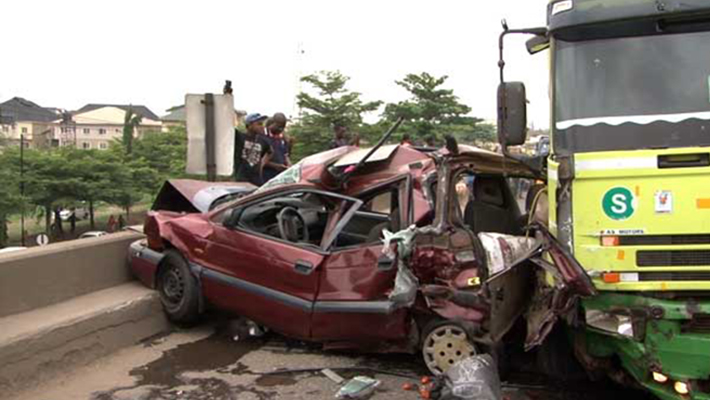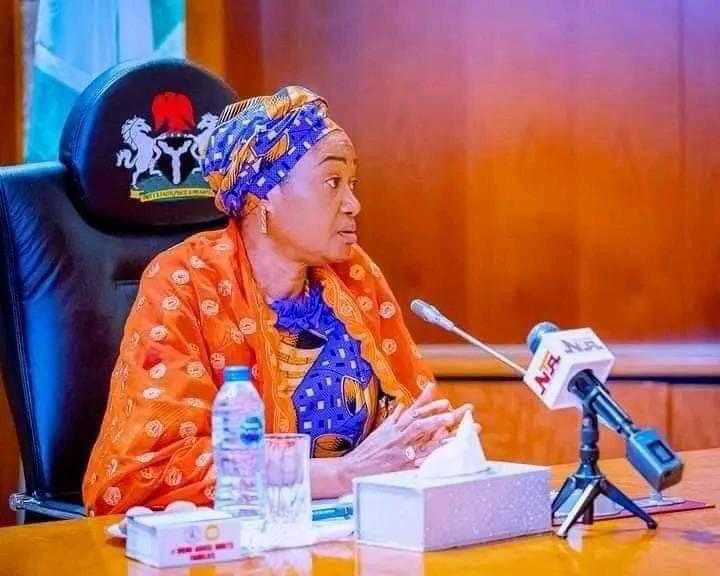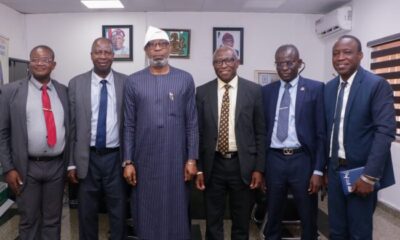Editorial
Nigeria’s ecosystem suffers strains of illegal mining: Govt must be deliberate for clampdown
The mining sector in Nigeria, rather than forming a formidable force for economic strength which it has the potential to drive, has become an endangered specie with the scourge of illegal ventures which have entangled the sector.
It is apparent that the sector remains one of Nigeria’s worse affected sector, clustered by leakages of illegal operations. The architecture to infuse sanity into the sector has not so far yielded good results. As alleged, it is apparent the assertion that the illegal activities in the sector have underground formality of the backing of persons within the corridor of power in the Country, may not be disputable. Just as it is said of the phenomenon of oil theft in the Country, the unabated spread of flagrant operations of illegal mining may not be unconnected with subterranean backing of Nigerians in place of state power: Hence, the frustration of any architecture that may be presumed to be set in place to bring sanity into the sector.
Unravelling how foreigners arrived at mining sites without statutory licences evokes questions as to whose order, directive, or instruction are they operating on? Although, the arrest of some foreigners have been made known overtime, the revelations of the link that brought them on board, have been swept into the carpet. The investigations from arrests of culprits working indiscriminately on several mining sites across the Country have been held back from public knowledge, the financiers and those on whose directive they are working.
The fact that resources meant for the common good of the nation is narrowed illegally into the pocket of a few individuals to the detriment of the greatest number, is criminal. The deep seated nature of the phenomenon is apparently worrisome at a time when the country is suffering from revenue shortfalls. Far from the revenue-economic short-change, the environmental impacts of illegal mining are known to pose threats to the ecosystem.
Recently, Thursday 25th August, 2022, the Federal Government had again expressed worries over illegal mining activities in the Country, reiterating it will prosecute defaulters who fail to comply with extant environmental laws. The Director-General, National Environmental Standards and Regulations Enforcement Agency (NESREA), Prof. Aliyu Jauro, while briefing newsmen on the agency‘s activities in Abuja, had said the agency had recently been inundated with several complaints on the resurgence of the activities of artisanal miners in the Country. According to NESREA DG, situation had raised fears of degradation of the environment, destruction of farmlands and contamination of water sources, especially the Osun River. Such mining activities, he noted, were not new in the area because the State is sited on a schist-belt that is richly endowed with mineral resources such as gold, tourmaline, tantalite, among others.
“The river is a key source of water for humans, plants and animals within the area, and it has international interest because it passes through the Osun-Osogbo sacred grove. The area is designated as a United Nations Educational, Scientific and Cultural Organisation (UNESCO) World Heritage Site. Indeed, the river is reputed for its cultural, religious and economic significance,’’ he had said.
The NESREA DG who said that the agency had carried out sensitisation workshops for artisanal miners drawn from different parts of the State, said the miners were enlightened on the effects of the activities on human health and environment and were encouraged to carry out their activities in a saner environmentally manner.
“According to him, following the recent reports, the agency has intensified its compliance monitoring of the affected areas which revealed a large presence of Chinese miners. The Chinese miners with the aid of excavators and related equipment, mine and wash the minerals along or close to river courses. There is also high activity of artisanal miners who scavenge surface minerals at abandoned mine pits and wash them in nearby rivers, most of which flow into the river. The river has become more turbid with reddish coloration from the disturbance of mining and washing into the rivers,’’ he had said.
According to the DG, the situation was worrisome since the cultural practices at the Osun grove required contact with the water and people also use the water daily in their homes. He had said that the agency had conducted investigation which the water and soil were collected for laboratory analysis to determine the level of pollution of the activities.
“When the investigation is concluded, the provisions of the National Environmental Mining and Processing of coal, ores and industrial minerals Regulations, 2009 will be invoked against those involved in the activities.This will definitely mean that perpetrators will have their facilities sealed and they will be charged to court for environmental violation. As citizens, we have very important roles to play in protecting the environment and the agency continually educates Nigerians on the agency’s roles and responsibilities,” he had said.
More recently, the Revenue Mobilisation Allocation and Fiscal Commission (RMAFC) harping on the economic impacts of illegal mining, said the governments, especially States have been getting a ridiculous low revenue from the mining sector, rather than what was expected. The member representing Osun State at the Commission, Mr Oladele Gboyega, during a visit to the State’s Commissioner for Finance, Mr Bola Oyebamiji, in Osogbo, while the team was in Osun for the second phase of the nationwide monitoring of revenue collections, and to also observe mining activities across the state, frowned at the level of land degradation going on in mining sites across the State, stating there was an urgent need for sensitisation of the miners.
“We have identified the problem that we are not communicating with ourselves. The state is not communicating with the federal agency, the federal is not communicating with the state. So, now we are coming together to fashion out blueprint that will drive the process to ensure that we sanitise the mining activities. We are having clarity as to what we need to do to ensure that the revenue flows to that sector, at least, get to the federation account and it is enhanced. Currently, we are running at a very low, as if the state is not actually benefitting anything from the system now. So, we need to up that system to ensure that the maximum value for having resources at their disposal gets to them and that is what we are doing now,” Gboyega, who was received on behalf of the commissioner by the Senior Special Assistant to the Governor on Mineral Resources, Wahab Oyeniyi, was quoted.
Illegal mining has shown its negativities from all ends. Its impacts have not restricted its grip on the economy by short changing revenues meant for the general good, cornered by mischievous individuals, but also, its impacts on the environment pose serious threats to the ecosystem and by extension, Nigerians who are affected by these strains. It is pertinent for the Government to become true and sincere to prosecute a genuine fight against the phenomenon. Creating virile structures, while strengthening existing ones, to exterminate the wings of illegal mining in all the dimensions of its operations is pertinent, not only for economic good, but also for environmental preservation.
Editorial
Articulated vehicles and the scourge of avoidable deaths


Nigerians across the country continue to die utterly preventable deaths thanks to a lack of political will on the part of its leaders. It is an ugly fate thrust upon its citizens to live in a country whose economy is built upon the blood of the ordinary people, not out of sacrifice, but nonchalance. Articulated vehicles wipe out families, dreams, and human capital in one fell swoop. Press statements from the leaders are not enough. We need the May 2024 immediacy of the Tinubu administration in this sector too.
Last week, a falling container killed a woman in the Ogudu area of Lagos. The woman was inside a car when the fully loaded 40ft Mack articulated truck fell on it, leading to her instant death, according to the Lagos State Traffic Management Authority (LASTMA).
In October 2023, a businessman identified as Akuma Kalu, was crushed to death by a 40-feet container that fell on his car along the failed portion of Etche-Ngokpala road in Etche Local Government Area of Rivers state.
In September 2023, five women died in a fatal accident that occurred in the early hours of Friday at Odumodu Junction, Nteje, Oyi Local Government Area along Awka Road, Anambra State. As usual, the container of the truck fell upon the bus carrying these people, killing them. We could go on and on. The story remains the same: tragedy upon tragedy.
Every year, the Federal Road Safety Commission, FRSC, does sensitisation with little result to show for it because the arm of the law is too short to punish offenders at the root of the problem. The constant assault on the senses has led to a desensitisation on the part of the populace. Month after month, another story of a truck that erases a family, or multiple families because its brakes fail, or its container is overturned. The combination of the death of empathy on the part of leaders and the emotional exhaustion of the citizens will lead Nigeria down the path of a dystopia.
The governors of each state have a responsibility to institute laws to protect the indigenes. This, the Federal Government must also do nationwide. The FRSC has rules and regulations for trucks. The Government needs to only enforce these rules. Enough of blaming the trucks themselves because they are not the evil entities. The lack of accountability and a weak system perpetuates the dilemma.
The political class should not wait until Nigeria happens to one of their own before acting as is usually the case. Most cases bear the mark of immediate fatality. By the time a family member experiences it, it would have already been too late. We have hope that this administration will do what it takes to restore hope to the common man. Time to act is now.
Editorial
Renewed Hope Initiative: Beating back inequality in all spheres


Nigeria is full of inequalities that its leaders contend with administration after administration. With every President comes a partner who shares in the vision, and does her part to alleviate the pains of the citizens. Oluremi Tinubu has etched her name in the annals of history as one of such compassionate ones.
Recently, in Abeokuta she flagged off the Renewed Hope Initiative for women in agriculture and people living with disabilities nationwide in a bid to achieve this noble goal of equity in Nigeria.
“We are supporting 20 women farmers per state with the sum of N500,000 each. To this end, a draft of N10 million per state for the South West zone will be handed over to the first ladies of Ekiti, Lagos, Ogun, Ondo, Osun, and Oyo states who are the Renewed Hope Initiative (RHI) state coordinators for onward disbursement to all beneficiaries in their respective states,” she said.
“The Renewed Hope Initiative Social Investment Programme will be empowering 100 persons with disability, small business owners in Ogun State with a sum of N100,000 each to recapitalise their existing businesses.”
In Kebbi, represented by the Wife of the Speaker, House of Representatives, Fatima Tajuddeen Abbas, in Birnin Kebbi, she said, “Agriculture plays a pivotal role in achieving sustainable development and food security. Consequently, we are introducing ‘Every Home a Garden’ competition to encourage each Nigerian woman to cultivate a garden at home to feed the family and share with neighbours, we want to see food on every table.”
We commend the forward thinking and passion for national growth required for such a herculean task. If emulated in all quarters, it will stimulate the economy at the grassroots. It is well acknowledged that the government cannot do it alone. Private individuals who are capable must rise up to contribute to national growth.
It isn’t alien to the Nigerian condition, after all. The country was able to survive the assaults of the COVID-19 pandemic thanks to the joint efforts of private individuals under the umbrella of Coalition Against COVID-19, CACOVID, a Private Sector task force in partnership with the Federal Government, the Nigeria Centre for Disease Control (NCDC). The Renewed Hope Initiative joins the tradition of programmes committed to national improvement. History will look upon it kindly.
Editorial
Increasing access to community healthcare


Recently the World Health Organisation (WHO) decried the increasing threat to the right to health of millions of people across the world. The WHO Council on the Economics of Health for All has stated that 140 countries recognise health as a human right. Unfortunately, these countries are not passing and putting into practice laws to ensure that their citizens are entitled to access health services. According to the global health agency, about 4.5 billion people, over half of the world’s population, were not fully covered by essential health services in 2021.
The WHO Regional Director for Africa, Dr. Matshidiso Moeti, in her message underscored the fact that health is not only a fundamental human right, but also central to peace and security. According to her, addressing health inequities requires intentional efforts. Considerations of vulnerable groups must be addressed. Their needs ought to be purposefully integrated into health programmes at all levels to accelerate progress toward Universal Health Coverage (UHC).
‘My health, my right,’ the global agency used the occasion to call for action to uphold the right to health amidst inaction, injustice and crises. The year’s theme, according to the organisers, was chosen to champion the right of everyone, everywhere to have access to quality health services, education, and information, as well as safe drinking water, clean air, good nutrition, quality housing, decent working and environmental conditions, and freedom from discrimination.
Moeti noted that many in the African region still need help with access to quality essential health services due largely to unfulfilled rights. She observed that this is further compounded by protracted and ongoing crises such as conflicts, climate change, food insecurity, disease outbreaks and epidemics.
Available figures show that the number of people aged 15 and over living with HIV is still high at an estimated 24.3 million in 2021 (3.4 percent of the total population) compared to 15.6 million in 2015. This underscores the continued transmission of HIV despite reductions in the incidence of people newly infected and the benefits of significantly expanded access to antiretrovirals. Moeti called on member states to uphold the progress towards fulfilling the right to health, agreed by all nations of the world in 1948 and enshrined in the WHO Constitution.
“The right to health is a universal right of all human beings, regardless of race, colour, sex, language, religion, political or other opinion, national or social origin, property, birth, or another status,” Moeti stated.
Nigeria, the Coordinating Minister of Health and Social Welfare, Prof. Muhammad Ali Pate, has reiterated the ministry’s commitment to ensure the health and wellbeing of all Nigerians. The minister is of the view that the right to health is not just the ideal, it is a fundamental human right enshrined in the Universal Declaration of Human Rights.
For millions of Nigerians, accessing quality healthcare is a challenge. However, the federal government has mapped out some initiatives to address the challenge. These include Basic Health Care Provision Fund (BHCPF) and the Nigeria Health Sector Renewal and Investment Initiative and strategic partnerships through which the health ministry is ensuring access to health of Nigerians in remote communities across the country.
Unfortunately, the right to health for all Nigerians has not been enshrined in our laws. Therefore, we call on the federal and state lawmakers to make laws that will ensure the right to health of all Nigerians. We need laws that will ensure Universal Health Coverage for all Nigerians.
Such laws will ensure that every Nigerian has access to quality health at all times. These include having access to potable water, clean air, quality nutrition and quality housing, decent working environment and freedom from discrimination.
While the laws that will enforce the right to health of all Nigerians are being awaited, the government must improve access to health by ensuring that quality healthcare services are provided at the Primary Healthcare Centres (PHCs) across the 774 local government areas.
If the primary healthcare centres are functional, the nation’s disease burden would have been reduced by over 70 per cent. The government should provide free health services at the PHC level. For Nigeria to increase access to quality health for millions of Nigerians and ensure UHC, the health funding must be significantly increased.
Pathetically, it has become an eyesore that millions of Nigerians living at the grassroots don’t have access to quality healthcare services. This is a wakeup call to the various state Governors and their Chairpersons to reinvest in the health sector, especially the community people.
Most of the health institutions and healthcare facilities are in a dilapidated stage at the rural communities and there is no motivation for health personnel in terms of incentives, knowledge acquisition such as training and retaining of staff, the equipment in various hospitals and clinics are outdated. The federal government in partnership with international donors should reenergise in the health system for the betterment of the masses.
-
Finance3 months ago
Court orders Sen. Victor Umeh to repay N136m bank debt to AMCON
-



 Abuja Update2 months ago
Abuja Update2 months agoUNDP, FG partnership needed to achieve inclusion, equity- Minister
-
Abuja Update4 weeks ago
Banks drive stock market performance with N147bn gain
-



 Infotech3 weeks ago
Infotech3 weeks agoWorld Backup Day: NITDA urges Nigerians to ensure backup of data
-
capital market2 years ago
Rt.briscoe, FBNH, Others halts negative performance of stock market
-



 Health2 weeks ago
Health2 weeks agoImmunisation: FG, GAVI seek synergy with Sokoto Govt.
-
Infotech1 week ago
Forex for Beginners: Unveiling the currency exchange and how to trade it
-
Submission Guidelines4 months ago
CALL FOR SUBMISSIONS: POETRY COLUMN-NND










